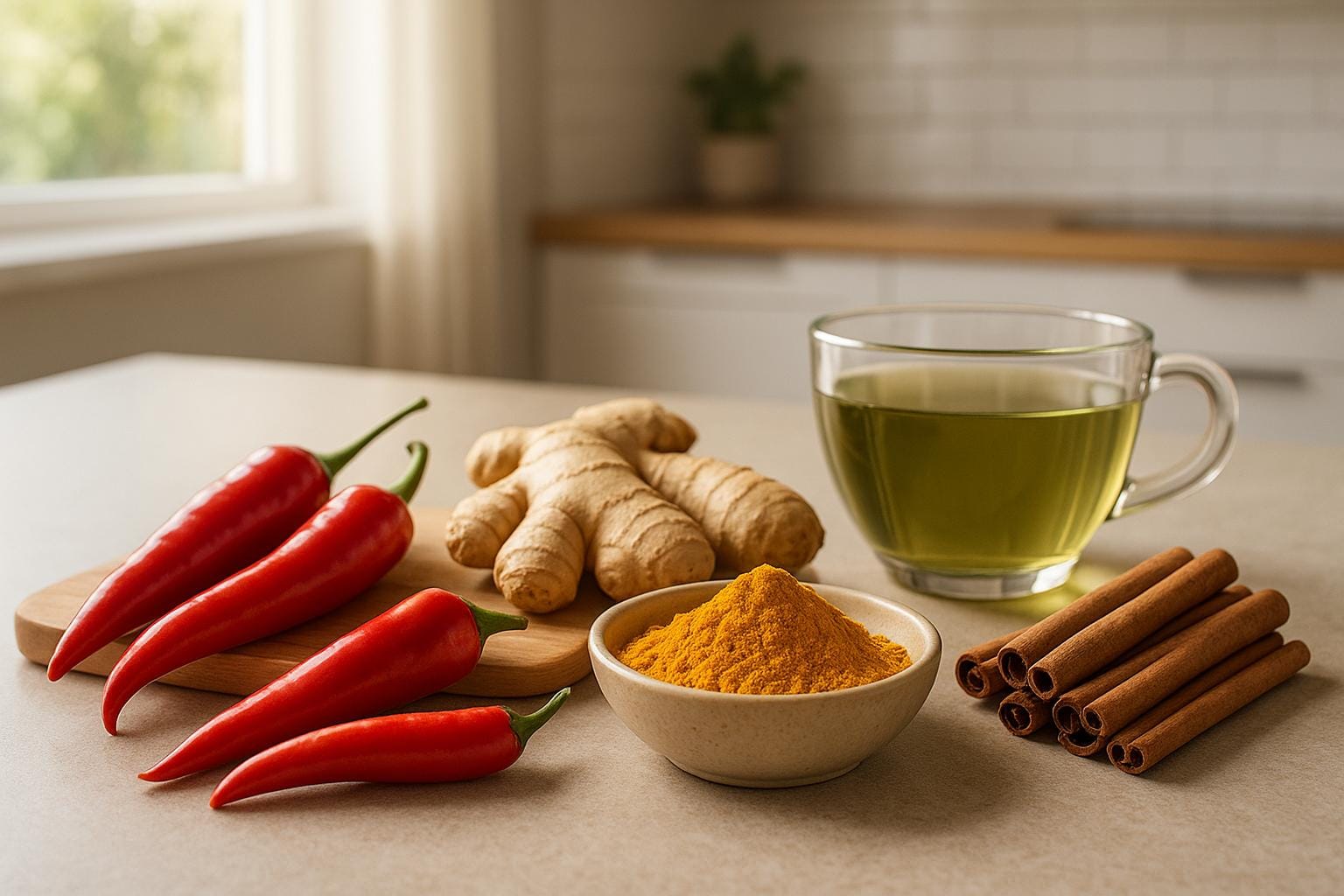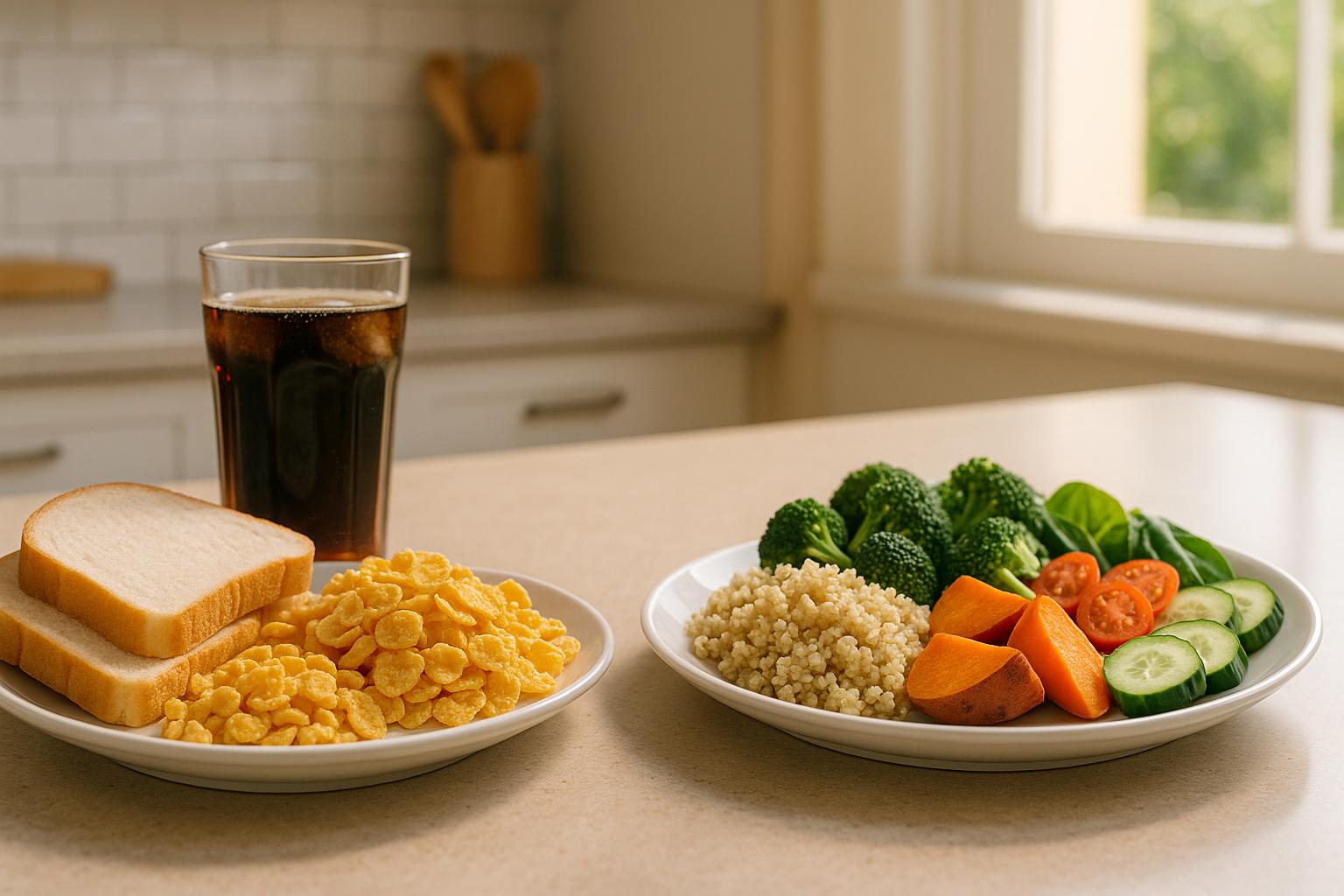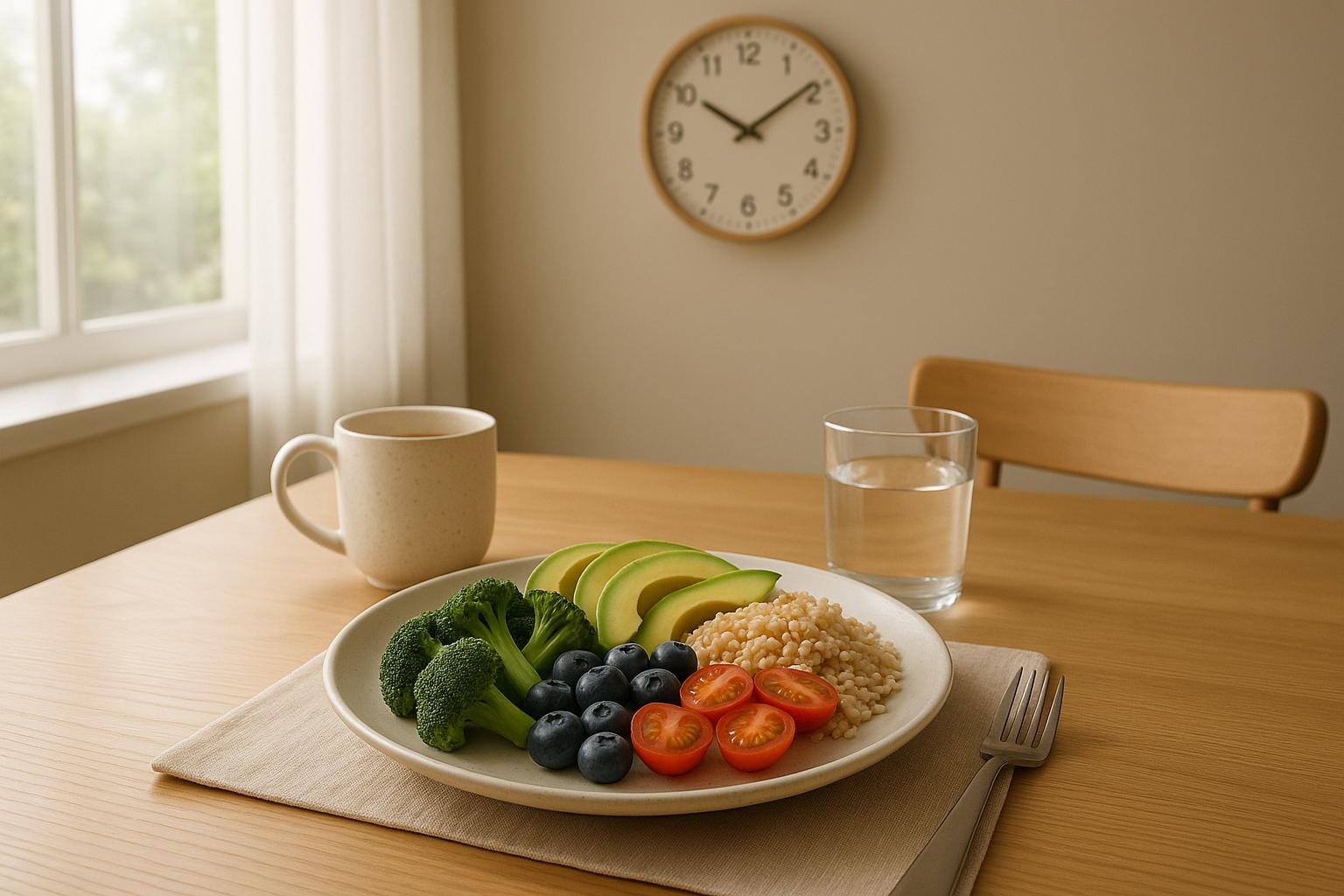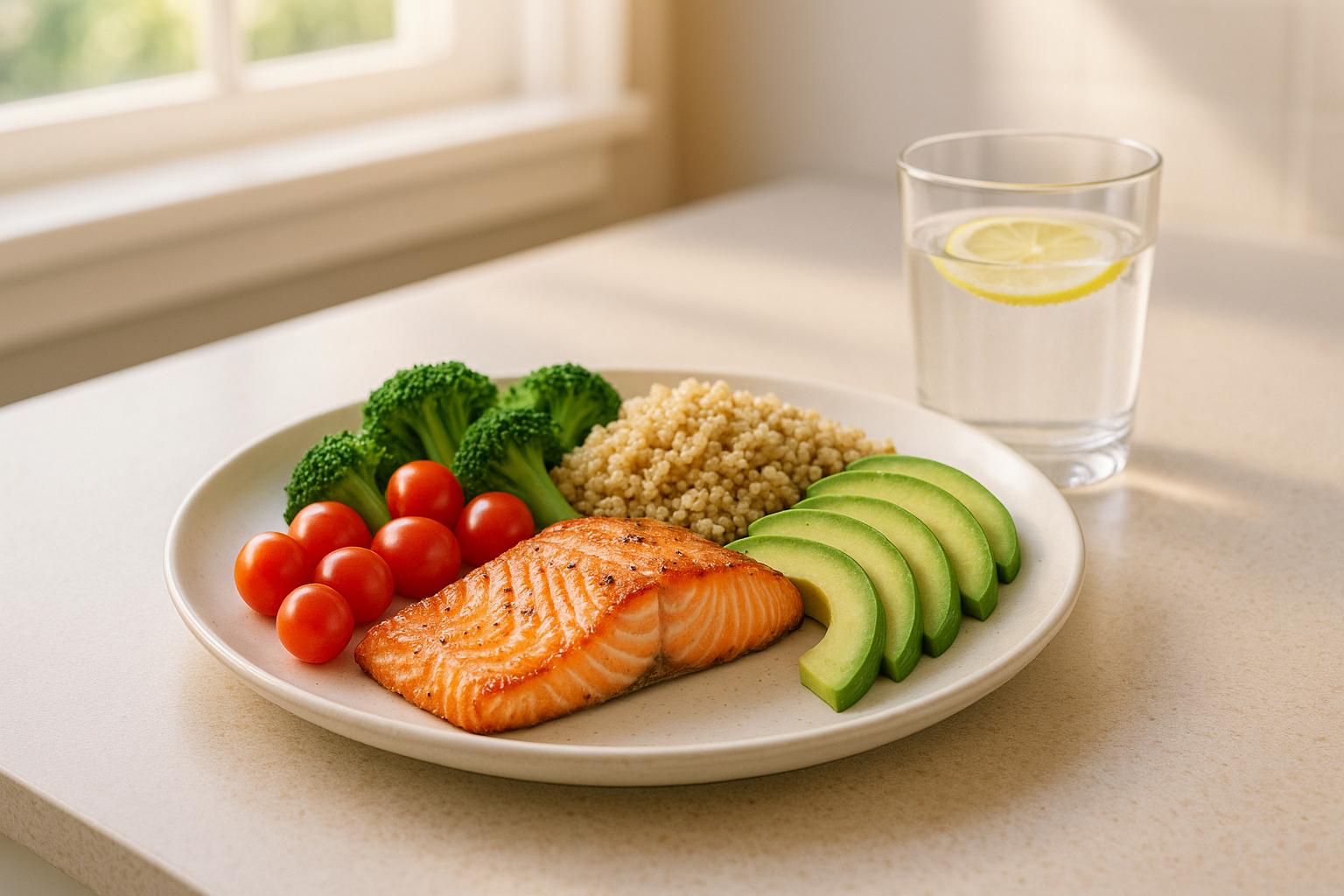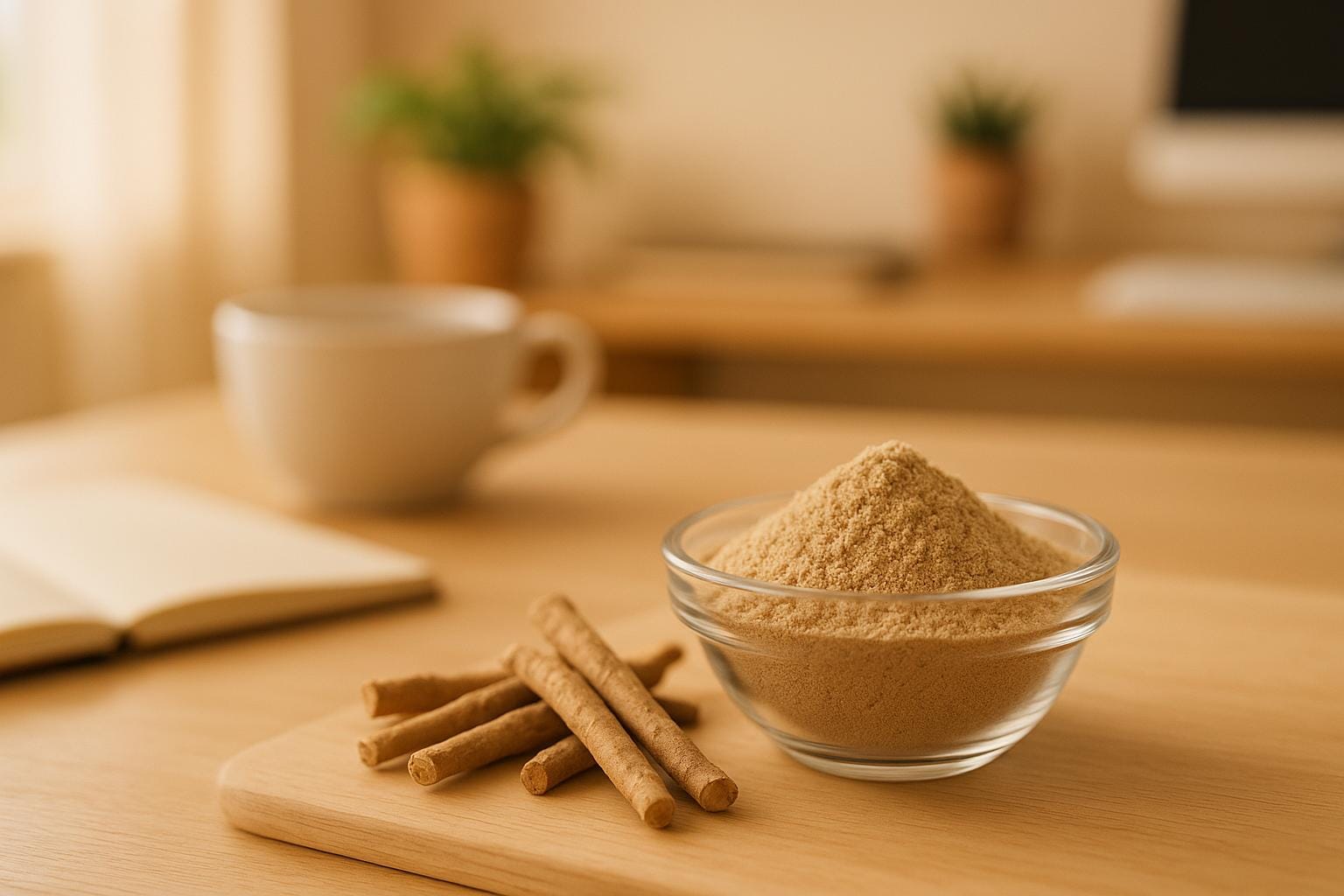Want to live longer and feel better every day? Small, consistent habits can make a big difference in your health and longevity. Here are 10 simple daily habits backed by science that can help you live a longer, healthier life:
- Exercise Daily: Aim for 30 minutes of activity, like walking, strength training, or yoga.
- Eat More Plants: Add fruits, vegetables, whole grains, nuts, and legumes to your meals.
- Get 7-9 Hours of Sleep: Stick to a consistent sleep schedule and create a relaxing bedtime routine.
- Drink Enough Water: Stay hydrated by drinking at least 64 ounces daily, adjusting for your weight and activity.
- Build Strong Relationships: Spend time with loved ones, connect with friends, and join community activities.
- Manage Daily Stress: Practice mindfulness, deep breathing, or yoga to reduce stress.
- Stop Smoking and Limit Alcohol: Quit smoking and keep alcohol intake within recommended limits.
- Keep Your Mind Active: Solve puzzles, learn new skills, or read to keep your brain sharp.
- Track Your Health Numbers: Monitor blood pressure, blood sugar, cholesterol, and other key metrics.
- Spend Time Outdoors: Get fresh air, sunlight, and enjoy nature to boost physical and mental health.
Start small. Pick one habit, build it into your routine, and gradually add more. Even tiny changes can lead to big improvements over time.
The Secrets of Longevity: 15 Habits of People Who Live to 100 | Healthy Lifestyle
1. Exercise Daily
Regular physical activity can significantly improve your health and increase your lifespan. Following a routine of 150 minutes of moderate exercise each week can lower the risk of chronic illnesses and lead to better overall health.
The key to sticking with exercise is finding activities you enjoy. Start with 30 minutes of moderate activity five days a week. If that feels overwhelming, break it into smaller sessions of 10-15 minutes. Here’s a guide to building a balanced routine:
Cardio Activities
Walking is a great starting point, especially for beginners. Aim for a brisk 20-30 minute walk each day. Try to maintain a pace where you can carry on a conversation but not sing. This simple habit can help lower blood pressure and strengthen your heart.
Strength Training
Incorporate 2-3 sessions of strength training each week to maintain muscle mass and support your metabolism. Begin with bodyweight exercises like push-ups and squats, then gradually move on to using weights or resistance bands.
Flexibility and Balance
Practices like yoga are especially helpful, particularly as you age. Yoga not only improves flexibility but also reduces the risk of falls. A gentle 20-minute yoga session in the morning can enhance your mobility and help you start the day with focus.
Sample Weekly Exercise Plan
| Day | Activity | Duration |
|---|---|---|
| Monday | Brisk Walking | 30 mins |
| Tuesday | Strength Training | 30 mins |
| Wednesday | Yoga | 20 mins |
| Thursday | Brisk Walking | 30 mins |
| Friday | Strength Training | 30 mins |
| Saturday | Yoga | 20 mins |
| Sunday | Light Walking | 20 mins |
Start at a pace that feels comfortable and gradually increase intensity as you build stamina. This routine is a solid starting point for improving your overall well-being.
This article is for informational purposes only and does not substitute for medical advice. Always consult a healthcare professional before starting a new fitness program.
2. Eat More Plants
Eating more plant-based foods can support a longer, healthier life. Research highlights that including a variety of fruits, vegetables, whole grains, nuts, and legumes in your diet can have a positive impact on overall health and lifespan.
Focus on filling your meals with vibrant fruits, nutrient-packed vegetables, hearty whole grains, protein-rich legumes, and healthy nuts. At the same time, try to cut back on processed foods high in sugar, refined carbs, and unhealthy fats. These small dietary changes can work hand-in-hand with other healthy habits.
Start simple: add an extra serving of vegetables to your meals or swap out refined grains for whole grains. These minor adjustments can lead to lasting improvements.
This article is for informational purposes only and does not replace medical advice. Always consult a healthcare professional before making significant dietary changes.
3. Get 7-9 Hours of Sleep
Getting enough sleep - ideally 7 to 9 hours each night - helps your body recover, keeps your brain sharp, and lowers the chances of health issues. Making sleep a priority is an important step toward staying healthy and living longer.
Here are three tips to improve your sleep:
-
Stick to a Consistent Sleep Schedule
Try to go to bed and wake up at the same time every day, even on weekends. This helps your body maintain a steady sleep-wake rhythm. -
Establish a Relaxing Bedtime Routine
Unwind with calming activities like reading, taking a warm bath, or listening to soft music. These habits signal to your body that it’s time to relax. -
Set Up a Sleep-Friendly Environment
Keep your bedroom dark, quiet, and cool to create the best conditions for restful sleep.
By following these steps, you can help your body recover naturally and feel ready for the next part of your wellness journey. Up next: staying hydrated to support your overall health.
This article is for informational purposes only and not meant as medical advice. Always consult a healthcare professional before making major changes to your health routine.
4. Drink Enough Water
Hydration is key to staying healthy and feeling your best. Since about 60% of your body is water, every cell relies on it to work properly. Water helps regulate your temperature, flush out waste, and support overall wellness. It works hand-in-hand with exercise, good nutrition, and stress management.
The general guideline is to drink 64 ounces (8 cups) of water daily, but your actual needs depend on factors like weight, activity, and environment:
| Factor | Suggested Water Intake |
|---|---|
| Body Weight | Add 0.5–1 oz per pound of body weight |
| Activity | Add 12 oz for every 30 minutes of exercise |
| Climate | Add 16–32 oz in hot or humid weather |
| Altitude | Add 16–32 oz above 8,000 feet |
Here are some tips to stay on top of your hydration:
- Drink 16 oz of water first thing in the morning.
- Keep a reusable water bottle handy at your desk or in your bag.
- Use phone alarms or apps to remind you to drink every couple of hours.
Want to check if you’re hydrated? Look for these signs:
- Your urine should be a light yellow color.
- Your skin should bounce back quickly when pinched.
- Steady energy levels can also indicate proper hydration.
If you’re working out, aim to drink 4–6 oz of water every 15–20 minutes. Spending time outdoors in the heat? Add at least 16 oz to your daily intake.
While plain water is ideal, other options can contribute to your hydration:
- Herbal teas (caffeine-free)
- Fruit-infused water
- Clear broths
- Water-rich foods like cucumbers and watermelon
Staying consistently hydrated supports all your other wellness habits.
This article is for informational purposes only and not a substitute for medical advice. Consult a healthcare professional before making changes to your fitness or wellness routine.
5. Build Strong Relationships
Strong relationships are linked to better health and longer lives. Studies show that meaningful social connections can improve both mental and physical well-being, helping you stay healthier as you age.
Here are some key ways relationships impact health:
| Benefit of Relationships | Positive Effects on Health |
|---|---|
| Emotional Support | Reduces stress and improves mental health |
| Sense of Belonging | Creates purpose and connection |
| Healthy Habits | Encourages better lifestyle choices |
| Mental Stimulation | Keeps the brain engaged and may lower the risk of cognitive decline |
To build and maintain strong social bonds, consider these strategies:
- Spend Quality Time with Family: Make an effort to share meals or plan regular get-togethers to strengthen emotional ties.
- Stay Connected with Friends: Schedule calls or meet-ups to keep your friendships strong and rewarding.
- Get Involved Locally: Join community groups, volunteer, or attend fitness classes to meet new people and expand your social circle.
- Create Social Traditions: Start rituals like weekly game nights or walks with neighbors to ensure regular interaction.
When engaging with others, focus on being present. Put away your phone, actively listen, and show genuine interest. If in-person meetings aren’t possible, video calls or virtual hangouts are excellent alternatives.
By investing in your relationships, you can improve your overall health and add more joy to your life. Up next, learn how managing stress can further support your well-being.
This article is for informational purposes only and does not replace medical advice. Always consult a healthcare professional before making lifestyle changes.
6. Manage Daily Stress
Long-term stress can take a toll on your health, but managing it daily can help protect both your mind and body. Just like other healthy habits, consistent stress management strengthens your overall wellness routine.
Here are a few proven techniques to help you handle stress:
| Technique | Benefits | Time Needed |
|---|---|---|
| Mindfulness Meditation | Eases anxiety and boosts focus | 10–20 minutes daily |
| Deep Breathing | Reduces stress and encourages relaxation | 5–10 minutes daily |
| Gentle Yoga | Loosens muscles, improves flexibility, and calms the mind | 15–30 minutes daily |
How to Get Started
- Mindful Breathing: Start with a simple 5-minute exercise. Sit in a comfortable position, close your eyes, and focus on your breath. Inhale deeply through your nose for 4 counts, hold for 4 counts, then exhale slowly for 6 counts. This activates your body’s natural relaxation response.
- Morning Movement: Kick off your day with gentle yoga or stretches. Poses like Child’s Pose, Cat-Cow, or gentle twists can release tension in your chest and shoulders while calming your mind.
- Eat Stress-Reducing Foods: Add foods like dark leafy greens, fatty fish, berries, nuts, seeds, and green tea to your diet. These can help reduce inflammation and support stress relief.
Take small breaks throughout the day to check in with yourself. These techniques work best when paired with good sleep, regular exercise, and a balanced diet. Building strong social connections can also amplify the benefits of your stress management routine.
This article is for informational purposes only and is not intended as medical advice. Always consult a healthcare professional before starting new fitness or wellness practices.
7. Stop Smoking and Limit Alcohol
Smoking and drinking too much alcohol can lead to serious health problems like heart disease, cancer, and respiratory issues. Cutting back on these habits can make a big difference in improving your overall health and lifespan.
Quitting Smoking
Your body starts to heal as soon as you stop smoking. To quit, consider talking to your doctor about creating a plan that works for you. Options include nicotine replacement therapies, joining a support group, or using resources like the National Quitline (1-800-QUIT-NOW).
Moderating Alcohol
Drinking too much alcohol raises the risk of liver disease, heart issues, and certain cancers. According to U.S. Dietary Guidelines, moderate drinking means up to one drink per day for women and up to two for men. To keep your drinking in check, try setting limits, having alcohol-free days, or tracking how much you drink.
Making these changes can be tough, but getting help from a professional can make it easier. Taking steps like these can contribute to a healthier and longer life.
This article is for informational purposes only and is not intended as medical advice. Please consult a healthcare professional before starting any new wellness routine.
8. Keep Your Mind Active
Engaging your brain daily can improve cognitive function and potentially increase longevity. Keeping your mind sharp complements your physical activities, contributing to overall well-being.
Ideas for Mental Workouts
- Solve Puzzles and Games: Dive into crosswords, Sudoku, or strategy games to challenge your brain in enjoyable ways.
- Learn Something New: Pick up a hobby, start learning an instrument, or try a new language to strengthen mental connections.
- Read and Write Regularly: Spend time reading books, articles, or even journaling. These habits help keep your mind alert.
Blending Mental and Physical Activities
Pairing mental exercises with physical movement can amplify their impact. Practices like yoga not only improve mental clarity but also support physical health. Similarly, meditation helps reduce stress and promotes a balanced mind.
Building a Routine for Brain Health
Incorporate mental challenges into your daily schedule. Start your day with yoga or meditation to set a focused tone. Take a break midday for a puzzle or reading, and end your evening with an activity that teaches you something new. These habits can keep your brain as active as your body.
This article is for informational purposes only and should not be taken as medical advice. Always consult a healthcare professional before starting any new fitness or wellness routine.
9. Track Your Health Numbers
Keeping an eye on key health metrics is just as important as staying active and eating well. Regular monitoring can help catch potential issues early and keep you on track for a healthier life.
Key Health Metrics to Watch
Blood Pressure
Aim for a healthy blood pressure of around 120/80 mmHg. Regular checks are easy - many pharmacies even offer free blood pressure testing.
Blood Sugar
Fasting blood sugar should fall between 70 and 100 mg/dL. If you’re managing diabetes or pre-diabetes, a home glucose meter can help you track it daily. The American Diabetes Association suggests testing before meals and two hours after eating to stay on top of your levels.
Cholesterol Levels
Routine cholesterol checks with your doctor are crucial. Here’s what to aim for:
- Total cholesterol: below 200 mg/dL
- LDL (bad) cholesterol: below 100 mg/dL
- HDL (good) cholesterol: 60 mg/dL or higher
- Triglycerides: below 150 mg/dL
Helpful Tracking Tools
Smart devices make it easier than ever to monitor things like heart rate and sleep patterns. Use them to stay consistent and integrate tracking into your daily routine.
How to Set a Monitoring Routine
- Daily: Check your heart rate and physical activity.
- Weekly: Track your weight and body measurements.
- Monthly: Measure your blood pressure.
- Quarterly: Get basic health screenings.
- Annually: Schedule a full physical exam with your doctor.
When to Call Your Doctor
If your numbers fall outside of these ranges, it’s important to act quickly. Contact your healthcare provider if you notice:
- Blood pressure consistently above 130/80 mmHg
- Fasting blood sugar levels over 126 mg/dL
- Sudden weight changes (more than 5 pounds gained or lost in a week)
- A resting heart rate consistently over 100 beats per minute
Keeping track of these numbers helps you stay in control of your health and take steps toward a longer, healthier life.
This article is for informational purposes only and is not a substitute for professional medical advice. Always consult a healthcare provider for guidance tailored to your needs.
10. Spend Time Outdoors
Once you've got a handle on tracking your health metrics, it's time to step outside. Spending time outdoors can improve your physical health and mental clarity. Studies highlight that activities like walking in a park or tending to a garden are linked to living longer and staying healthier.
These outdoor habits can work hand-in-hand with your exercise and stress management efforts.
Why Getting Outside Matters
- Encourages more physical movement
- Lifts your mood and helps your body soak up vitamin D
Easy Ways to Add Outdoor Time to Your Day
- Start your morning with a quick stroll through a local park
- Step outside during breaks to enjoy some fresh air
- Pick up outdoor hobbies like gardening to relax and recharge
Adding outdoor time to your daily routine is a simple way to support your overall well-being.
This article is for informational purposes only and does not replace professional medical advice. Always consult your healthcare provider for personalized guidance.
Conclusion
Living a longer, healthier life doesn’t mean overhauling your entire routine overnight. Research highlights that small, consistent changes can make a big difference in both how long and how well you live.
Start simple. Take a 10-minute walk each day and work your way up to 30 minutes. Once that feels natural, add another positive habit - like including an extra serving of vegetables at dinner. These small steps add up over time.
Build a Routine That Sticks
Lasting change thrives on structure and persistence. Here’s how to get started:
- Pick one habit to focus on first
- Set a specific time for the activity
- Track your progress to stay motivated
- Celebrate small victories along the way
- If you miss a day, jump back in without guilt
Consistency beats perfection. Tailor these habits to fit your lifestyle so they’re enjoyable and sustainable.
For more guidance, check out Fitup’s resources. Their articles, like "7 Morning Yoga Poses for Better Energy and Focus" or "Beginner's Guide to Mindfulness Meditation", offer practical tips to help you integrate these habits into your daily life.
Even the smallest steps can lead to a longer, healthier future.
This article is for informational purposes only and not a substitute for professional medical advice. Always consult a healthcare provider before starting a new fitness or wellness routine.
FAQs
What are some tips to stay motivated while building daily habits for a longer life?
Staying motivated to build daily habits can feel challenging, but a few strategies can make it easier. Start small by focusing on one or two habits at a time, like taking a 10-minute walk or adding more vegetables to your meals. Set realistic goals to avoid feeling overwhelmed.
Tracking your progress can also help. Use a journal or app to celebrate small wins, like drinking enough water or meditating for five minutes a day. Additionally, pair habits with something enjoyable - for example, listen to your favorite podcast while exercising.
Finally, remember your why. Whether it’s staying healthy for your family or improving your quality of life, keeping your goals in mind can inspire you to stay consistent.
What are some practical tips to help quit smoking and cut back on alcohol for better health?
Quitting smoking and reducing alcohol consumption are vital steps toward a healthier, longer life. Here are a few practical tips to get started:
- Set clear goals: Decide on a quit date for smoking or set limits for alcohol intake. Writing down your goals can help keep you accountable.
- Seek support: Reach out to friends, family, or support groups for encouragement. Professional counseling or therapy can also be highly effective.
- Replace habits: Find healthier alternatives to replace smoking or drinking, such as chewing gum, drinking herbal tea, or engaging in a hobby.
- Manage triggers: Identify situations or emotions that lead to smoking or drinking and plan ahead to handle them differently, like going for a walk or practicing mindfulness.
Remember, progress takes time, so be patient with yourself and celebrate small victories along the way. If needed, consult a healthcare professional for personalized guidance and resources.
How can I add more plant-based foods to my meals without feeling like I’m missing out?
Incorporating more plant-based foods into your meals can be simple and enjoyable. Start by making small swaps, like using almond or oat milk in your coffee or smoothies instead of dairy. Add a handful of spinach or kale to your morning eggs or blend it into a smoothie for a nutrient boost.
Experiment with hearty plant-based proteins like lentils, chickpeas, or black beans in dishes you already love, such as tacos, stews, or salads. You can also try meat alternatives like tofu or tempeh, marinated and cooked to your taste. For snacks, opt for nuts, seeds, or fresh fruit paired with a plant-based yogurt or nut butter.
The key is to focus on variety and flavor. Season your plant-based dishes with herbs, spices, and sauces you enjoy to make them satisfying and delicious. Over time, you’ll find it easier to incorporate these foods without feeling restricted.



